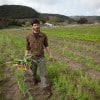Hazon is excited to be supporting the following organizations in their efforts to create healthier and more sustainable communities in the Jewish world and beyond!


Hazon is excited to be supporting the following organizations in their efforts to create healthier and more sustainable communities in the Jewish world and beyond!

Take Sustainable Agriculture, Food Justice and Torah to the Next Level!
For professionals or lay leaders who are involved in agency or synagogue gardening, CSAs or greenmarkets or who would like to begin programs of this nature. Also relevant for food service providers or nutritionists who buy or provide food for their agencies. Your organization or synagogue can begin to prepare for next summer NOW. Come learn from experts about how to create a number of different kinds of food programs that address climate change, build community and local economy, and help people eat more healthfully. Specifically you’ll hear about community-supported agriculture programs (CSAs), farmer’s markets, and gardening that provide opportunities for education, growing food, and engagement of people of all ages. And, as always, you’ll meet in small groups to learn more from the presenters and each other. (more…)
Hazon, together with the Jewish Farm School, invite you to be a part of the Shmita Project, whose purpose is to consider the role of Shmita, the Sabbatical year, in our lives. Shmita Project encourages people to do that in two ways: through using the laws and values of Shmita as the conceptual framework for creating a more sustainable Jewish community and a more sustainable world. Second, to encourage practical application of Shmita laws among individuals and communities. In honor of this week’s Torah portion which discusses the laws of Shmita, I would like to explore some of the themes behind the laws. There are three things which the Torah calls “Shabbat Shabbaton.” The first is Shabbat itself, the second is Yom Kippur, and the third is Shmittah. These three concepts: Shabbat, Yom Kippur and Shmittah, can be seen as pathways to the unification of the spiritual/religious personality. On an ordinary weekday it is all too easy to maintain the distance between our spiritual life and what we might mistakenly consider our ‘secular life.’ We are caught up in the decidedly non-spiritual routine of the workplace, the highway, and the shopping mall. On Shabbat however, we are granted a sanctuary […]
